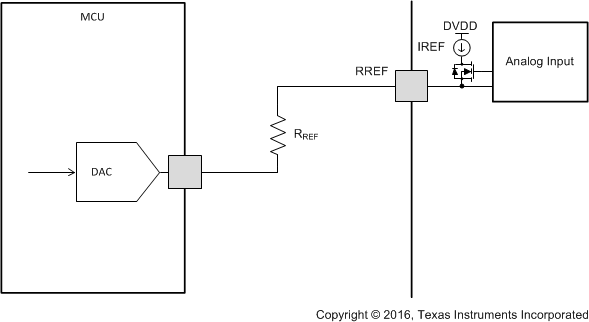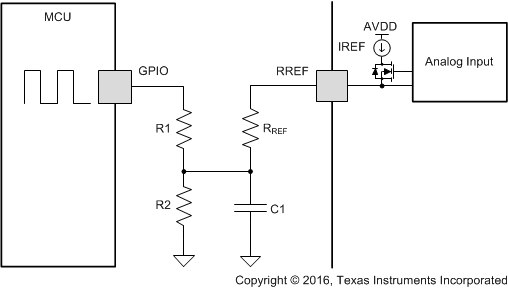JAJSCW7D January 2016 – November 2018 DRV8884
PRODUCTION DATA.
- 1 特長
- 2 アプリケーション
- 3 概要
- 4 改訂履歴
- 5 概要(続き)
- 6 Pin Configuration and Functions
- 7 Specifications
-
8 Detailed Description
- 8.1 Overview
- 8.2 Functional Block Diagram
- 8.3
Feature Description
- 8.3.1 Stepper Motor Driver Current Ratings
- 8.3.2 PWM Motor Drivers
- 8.3.3 Microstepping Indexer
- 8.3.4 Current Regulation
- 8.3.5 Controlling RREF With an MCU DAC
- 8.3.6 Decay Modes
- 8.3.7 Blanking Time
- 8.3.8 Charge Pump
- 8.3.9 LDO Voltage Regulator
- 8.3.10 Logic and Multi-Level Pin Diagrams
- 8.3.11 Protection Circuits
- 8.4 Device Functional Modes
- 9 Application and Implementation
- 10Power Supply Recommendations
- 11Layout
- 12デバイスおよびドキュメントのサポート
- 13メカニカル、パッケージ、および注文情報
パッケージ・オプション
メカニカル・データ(パッケージ|ピン)
サーマルパッド・メカニカル・データ
発注情報
8.3.5 Controlling RREF With an MCU DAC
In some cases, the full-scale output current may need to be changed on the fly between many different values, depending on motor speed and loading. The RREF pin reference current can be adjusted in system by tying the RREF resistor to a DAC output instead of GND.
In this mode of operation, as the DAC voltage increases, the reference current will decrease, and therefore, the full-scale current will decrease as well. For proper operation, the output of the DAC should not rise above VRREF.
 Figure 15. Controlling RREF With a DAC
Figure 15. Controlling RREF With a DAC The chopping current as controlled by a DAC is calculated as in Equation 2.

Example: If a 20-kΩ resistor is connected from the RREF pin to the DAC, and the DAC is outputting 0.74 V, the chopping current will be 600 mA (TRQ at 100%).
RREF can also be adjusted using a PWM signal and low-pass filter.
